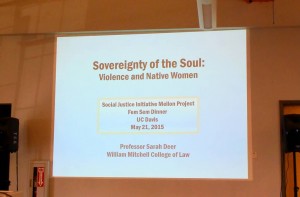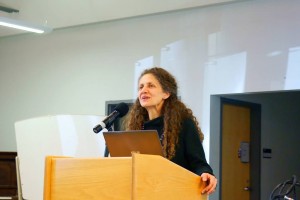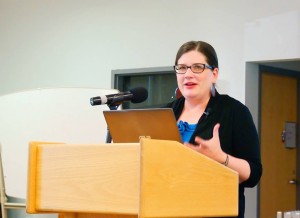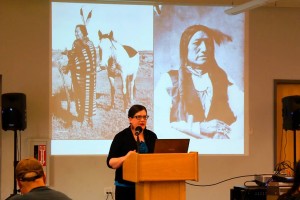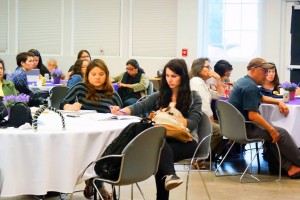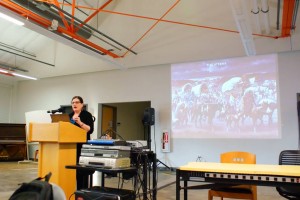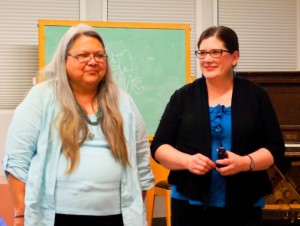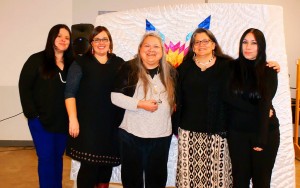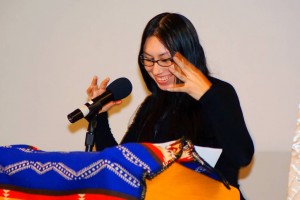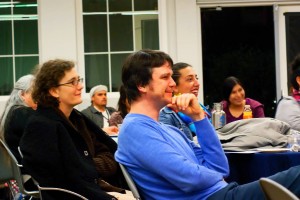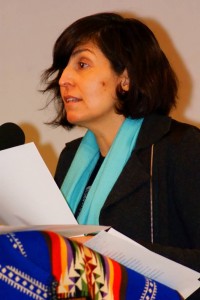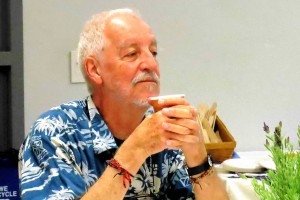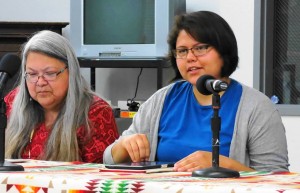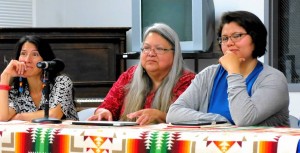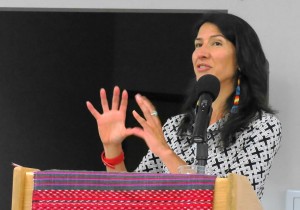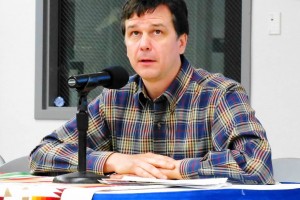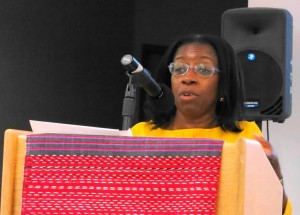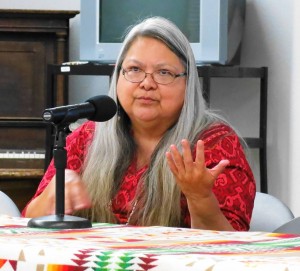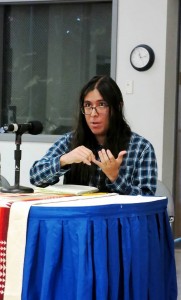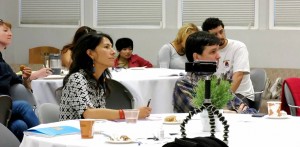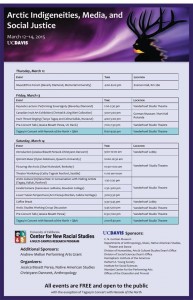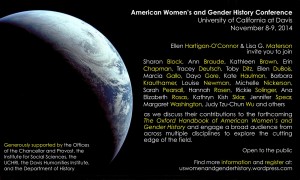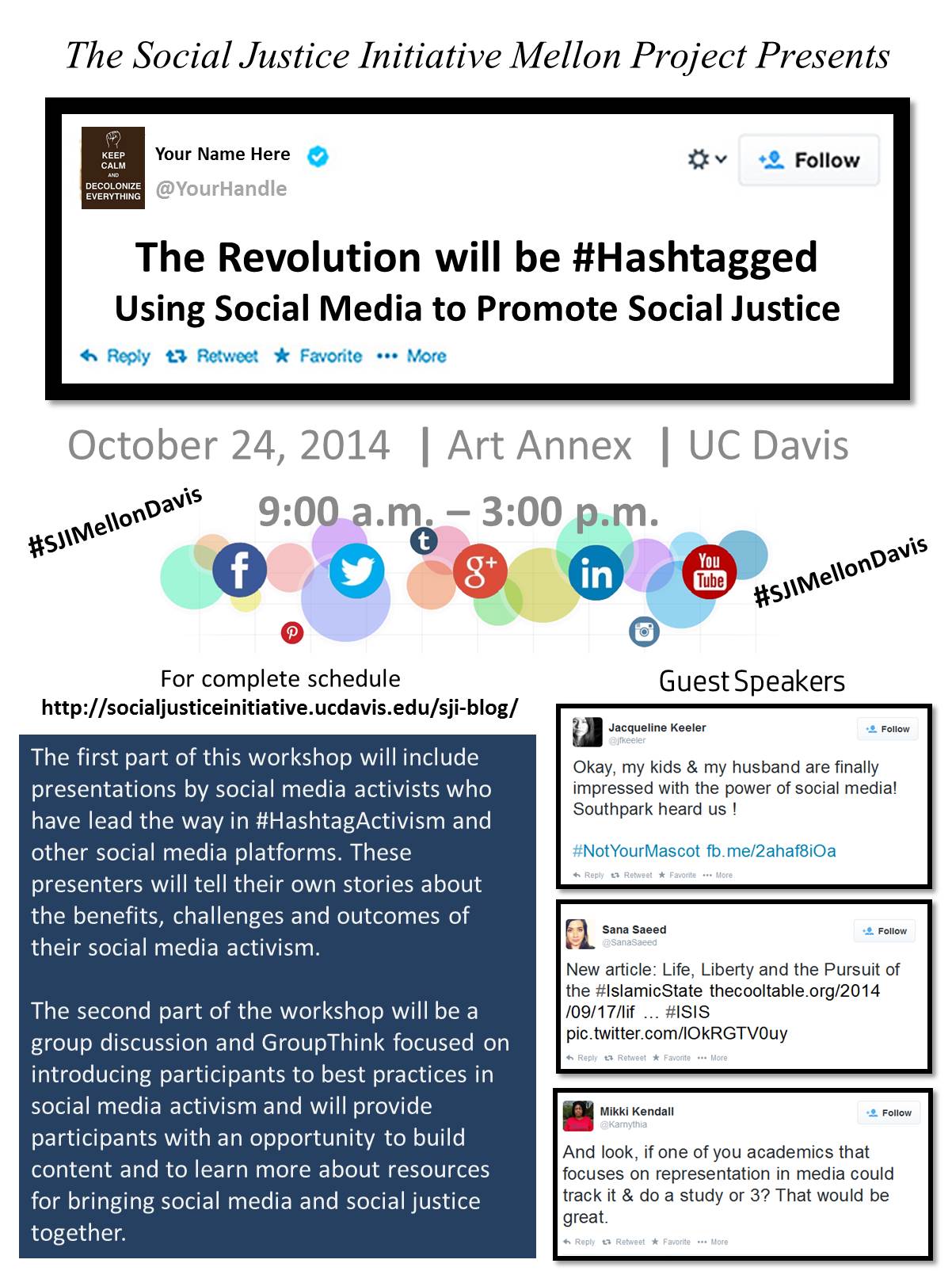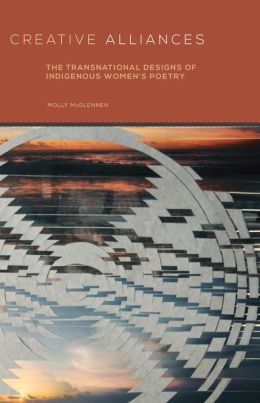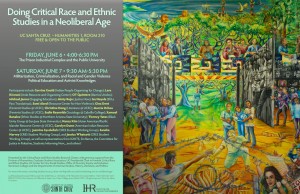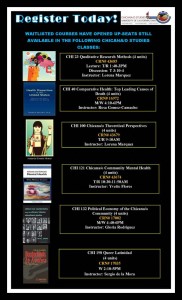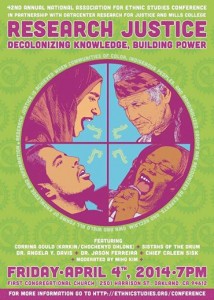CALL FOR APPLICATIONS UCD 2016 SOCIAL JUSTICE INITIATIVE GRADUATE SUMMER RESEARCH FELLOWSHIPS
April 13, 2016
Call for Applications
UC Davis Social Justice Initiative
2016 Graduate Summer Research Fellowships
Deadline: May 27, 2016, by 5 pm
The Social Justice Initiative, with sponsorship from the Mellon Foundation, is pleased to announce a call for proposals for the Social Justice Initiative Graduate Fellowships for Summer 2016. Up to 8 awards of $2,500 each will be awarded to support research on topics related to social justice issues impacting indigenous peoples, Chicanxs/Latinxs, and LGBTQ. Those eligible to apply are graduate students in the Native American Studies Graduate Program, and graduate students doing the Designated Emphasis in Native American Studies and Women, Sexuality and Gender Studies. Funds may be used for research related expenses, research related travel, and for living expenses while conducting research and writing. To apply, submit a proposal of no more than 500 words explaining the research project, an itemized budget, and a CV.
Proposals should be submitted by email to the Mellon Initiative: melloninitiative@ucdavis.edu.
Please note: Students completing their degree requirements in Spring 2016 are not eligible for this award. Funds must be used by October 9, 2016. Grant awardees are required to submit a report on their research by October 20, 2016. Grant awardees are also required to give a talk/presentation on their research during late Fall 2016, or early Winter 2017.
Please click here to download the flyer.
Social Justice Initiative Mellon Project | Women & Gender Studies Fem Sem Dinner feat. Sarah Deer
June 18, 2015
Visiting Artist Event feat. George Longfish (May 22, 2015)
Please enjoy these photos from our visiting artist event featuring George Longfish taken by NAS Graduate Student Bayu Kristianto. (Thank you Bayu!)
Photos: Indigenous Performativities Literary Festival (February 26, 2015)
May 22, 2015
Please enjoy these photos from our Indigenous Performativities Literary Festival event taken by NAS Graduate Student Bayu Kristianto. (Thank you Bayu!)
February 26, 2015
Indigenous Literary Festival
w/ Alice TePunga Sommerville & Deborah Miranda
6:00 p.m. – 8:00 p.m.
Art Annex
UC Davis
Indigenous Performativities Performers: Cutcha Risling Baldy, Alice TePunga Sommerville, Ines Hernandez-Avila, Deborah Miranda, Patricia Killelea
Photos: Indigenous Languages: Presence, Practice, and Sustainable Futures (May 15, 2015)
Please enjoy these photos from our Indigenous Languages: Presence, Practice and Sustainable Futures event taken by NAS Graduate Student Bayu Kristianto. (Thank you Bayu!)
May 15, 2015
10:00 AM – 4:00 PM
Art Annex, UC Davis
Indigenous Languages: Presence, Practice, and Sustainable Futures
“Epistemological and Healing Properties of Indigenous Languages” by Dr. Beth Piatote
“Multilingual Publics, Monolingual Address and Translation: Instances from African Literature and Popular Film” by Dr. Moradewun Adejunmobi
Call for Applications UCD Social Justice Initiative Graduate Summer Research Fellowships
May 14, 2015
Call for Applications
UCD Social Justice Initiative
Graduate Summer Research Fellowships
Deadline: May 29, 2015 by 5 pm
The Social Justice Initiative, with sponsorship from the Mellon Foundation, is pleased to announce a call for proposals for the Social Justice Initiative Graduate Fellowships for Summer 2015. Up to 8 awards of $2500 each will be awarded to support research on topics related to indigenous peoples and social justice. Those eligible to apply are graduate students in the Native American Studies Graduate Program, and graduate students doing the Designated Emphasis in Native American Studies. Funds may be used for research related expenses, research related travel, and for living expenses while conducting research and writing. To apply, submit a proposal of no more than 500 words explaining the research project, an itemized budget, and a CV.
Proposals should be submitted by email to the Mellon Initiative: melloninitiative@ucdavis.edu.
Please note: Students completing their degree requirements in Spring 2015 are not eligible for this award. Funds must be used by October 9, 2015. Grant awardees are required to submit a report on their research by October 9, 2015. Grant awardees are also required to give a talk/presentation on their research during late Fall 2015, or early Winter 2016.
Upcoming Related Event: Gradual Radicalization: The Decision Making Process for the Armenian Genocide
April 29, 2015
and the Turkey Studies Research Cluster of the UC Davis Humanities Institute
present
The Decision Making Process for the Armenian Genocide
Robert Aram, Marianne Kaloosdian and Stephen and Marian Mugar Chair
in Armenian Genocide Studies at Clark University
@ Davis Odd Fellows Hall (415 Second Street)
Debates around mass murders boil down to two central questions: What happened? Why and how did it happen? In the Armenian Genocide research, ³what happened² question got answered at least in broad terms. Although we still do not have all the details of what was experienced at the local level, we do have a good general picture of how the genocide was launched and how it was developed as a state policy. This is however not true for the ³why² and ³how² questions which are mostly explained with either ³Premeditated Continuum² or ³Wartime Radicalization.² The debate in question is really an offshoot of several peripheral questions regarding the intentions, motives, ideologies, and motivating anxieties of the decision makers. If in fact there was a final formal decision for the genocide, we have to answer a list of questions: What stages did it pass through before it reached its final conclusion? When and how did the decision take the shape of a plan? Akçam argues that we are still very far from such a level of sophistication given that much of the debate is driven by speculation rather than documentation. In this talk, he aims to reconstruct the decision making process based on Ottoman documents.
Please note that the venue¹s seating capacity is limited with 225 people. Plan to arrive early to secure a seat.
The lecture will be recorded and made available online at ME/SA¹s website: http://mesa.ucdavis.edu.
The closest parking lot (with free parking up to three hours) is located at the corner of First and F streets.
For more information, please contact Gurjit Mann, ME/SA Program Coordinator, at gkmann@ucdavis.edu.
Upcoming affilated event: “ARCTIC INDIGENEITIES, MEDIA, AND SOCIAL JUSTICE” SYMPOSIUM
March 9, 2015
“ARCTIC INDIGENEITIES, MEDIA, AND SOCIAL JUSTICE” SYMPOSIUM
March 12-14, 2015 @ UC DAVIS
Evening performances by Visiting Artist in Residence Tanya Tagaq Gillis, in concert with “Nanook of the North”
REGISTER FOR FREE
Friday’s Events:
https://www.eventbrite.com/e/arctic-indigeneities-media-and-social-justice-symposium-tickets-15792262081
Saturday’s Events:
http://www.eventbrite.com/e/arctic-indigeneities-media-and-social-justice-symposium-tickets-15792502801
[Exception = Tagaq concert tickets for purchase at Mondavi Center]
Social Justice Initiative Graduate Research Fellows share their research funded by the SJI
December 12, 2014
SJI Graduate Research Fellows
On Friday December 12, 2014 the Social Justice Initiative Graduate Research Fellows presented on the research they completed because of funding from the SJI. We hope to continue these fellowships this year and look forward to supporting other graduate student work.
Stephanie Maroney
Graduate Group in Cultural Studies DE:Feminist Theory & Research
“Cultural Fermentation: Reimagining Food Politics with Bacteria“
While I primarily analyze the cultural discourse of nutrition science and dietary health, I am interested in mixed methodological research approaches that often categorize Cultural Studies scholarship. The generous research fellowship from the Mellon Social Justice Initiative allowed me to explore my research on fermentation revivalism through participant observation during a three-week fermentation residency in rural Tennessee. This offered me unparalleled access to one of the main figures of my dissertation research and enriched my reading and contextualization of his written work. I deeply appreciate the opportunity to arrange my thoughts on the residency into a coherent narrative and presentation to share with the other SJI fellows.
Amanda Modell
Cultural Studies DE: Feminist Theory & Research
“Mapping the Music Genome: Imaginative Geography in Pandora Internet Radio and National Geographic’s Genographic Project“
Thanks to the generous support of the UC Davis Social Justice Initiative, I was able to conduct research at Pandora headquarters in Oakland during summer 2014. I met with several members of the music analysis team, and used what I learned to write an essay. The essay examines the promotional materials and structuring logics of Pandora’s Music Genome Project and National Geographic’s Genographic Project to understand how “code” works literally and metaphorically to establish a consumer’s sense of self. I argue that with appeals to consumers’ self discovery, the Genographic Project and the Music Genome Project rely on common sense ideas of race informed by place, or “imaginative geography,” while simultaneously reinforcing those ideas. In looking at genomics as a metaphor and organizing logic for music, I am ultimately interested in how popular science and popular culture co-constitute common sense ideas of race and identity. -Amanda Modell
Diana Pardo-Pedraza
Graduate Group in Cultural Studies DE:Feminist Theory & Research
“Learning how to walk: landmine occupation of peasant life.”
With the support of the Social Justice Graduate Research Fellowship, I conducted preliminary fieldwork in Arauca, Colombia. During two weeks, I participated in several mine risk education trainings and workshops, informally interviewed local NGO staff and landmine victims and organizers, went to a variety of public and private events with residents and the local humanitarian team, and personal and familiar reunions of some landmine victims. Thanks to these workshops and meetings in different villages of Arauca, 1. I expanded my base of contacts in the province, 2. Secured institutional and local support, and 3. I was able to better my regional understanding in regards to landmine presence, militarization, and local traditional and emerging economies.
I am particularly grateful for the insights I gained through my participation in the mine risk education workshops, which are provided by the government and NGOs. These workshops showed me a particular non-explosive capacity of mines: how landmines presence alters people’s ways of walking their territory and their physical and affective engagements with it. Through these workshops people who decide to stay and remain living amid minefields learn safe behaviors (comportamientos seguros), which are daily, ordinary practices that could prevent possible landmine accidents. Actually, walking is a central “safe behavior” taught and rehearsed during these sessions. Peasants are “trained” to pay attention to “clues” on the land while walking, including footprints of humans and animals, new growing vegetation, the presence of strange and unfamiliar objects, etc.
Bidita Jawher Tithi
Geography Graduate Group DE: Feminist Theory & Research
“An Investigation of the Discourse(s) of Climate Change Victimhood and Mitigation in Bangladesh”
Angel Hinzo
Native American Studies DE: Feminist Theory & Research
“Voicing Across Space: Subverting Colonial Structures in Ho-Chunk/Winnebago Tribal History.”
Roundtable Discussion: Settler Colonialism in Palestine in Comparative Perspective
December 5, 2014

Join us for a Social Justice Initiative Mellon Project Roundtable
Settler Colonialism in Palestine in Comparative Perspective
Monday December 8, 2014
4:00 p.m.- 5:00 p.m. | 3201 Hart Hall
w/ Professor Magid Shihade
MSA 181C: Topics in Arab Studies Seminar Students
This roundtable is an exploration of the question of settler colonialism in Palestine using a comparative framework to discuss other settler colonial cases in an attempt to study the rationales, dynamics, structures, and impact of settler colonialism. A historical examination of examples such as the United States, Australia, and Canada as presumably completed projects of settler colonialism will allow for a critical view and a deeper understanding of processes in Palestine-Israel, and the possibilities for the future of the peoples there.
Upcoming (related) event: October 18, 2014 9:00 a.m. – 6:00 p.m. 3rd Annual Empowerment Conference: “A Litany for Survival”
October 16, 2014
Upcoming (related) Event: American Women’s and Gender History Conference (November 8-9, 2014)
October 13, 2014
Upcoming Campus Lecture Series (Related): Fall Quarter 2014 NAS Brown Bag Lecture Series
Fall Quarter 2014 NAS Brown Bag Lecture Series
***Special focus on NAGPRA-related research, policy, and practice***
Wednesdays from 12:15pm-1:30pm
Risling Room (3201 Hart Hall)
The Native American Studies Department at UC Davis hosts a quarterly lunchtime lecture series featuring presentations by UC Davis faculty and graduate students, as well as invited regional guests whose work addresses issues central to Native American and Indigenous Studies.
10/15: Megon Noble, M.A., NAGPRA Project Manager at UC Davis
“NAGPRA at UC Davis: Past, Present, Future”
10/29: Darren Modzelewski, J.D., Ph.D., L.L.M., Teaching Fellow at James E Rogers, College of Law at the University of Arizona
“Archaeo-Legal Landscapes of Identity: Defining ‘Indian’ in a Post NAGPRA World”
11/5: Marcos Guerrero, Cultural Resources Manager, United Auburn Indian Community of the Auburn Rancheria
“United Auburn Indian Community NAGPRA in Practice”
11/19: Jelmer Eerkens, Ph.D., Professor of Anthropology at UC Davis
“Archaeological Approaches to Reconstructing Foodways and Warfare in Central California”
12/3: Cutcha Risling Baldy and Vanessa Esquivido, Ph.D. Candidates in NAS at UC Davis
“The Uneasy Remains Film Project & UC Davis: Investigating NAPGRA Implementation and Policies at the University of California”
12/10: Doris Maldonado, UC President’s Postdoctoral Fellow in NAS at UC Davis
“Rethinking Archaeological Practice and Relationships, Past and Present: Lessons from Honduras and Mexico
Upcoming Campus Event: “City of Radical Memory: Reclaiming Spaces of World War II Home Front Repression and Resistance in the San Francisco Bay Area”
CULTURAL STUDIES GRADUATE GROUP
Fall 2014 COLLOQUIUM SERIES
===============================
Thursday, October 16, 2014 4:10-6:00 pm, 3201 Hart Hall
Javier Arbona, Chancellor’s Postdoctoral Fellow, American Studies, UC Davis.
“City of Radical Memory: Reclaiming Spaces of World War II Home Front Repression and Resistance in the San Francisco Bay Area”
Javier Arbona works at the intersection between architecture, landscape, theory, and geography. A Chancellor’s Postdoctoral Fellow in the American Studies program at UC Davis, his current book project focuses on spaces of memory and militarization in the San Francisco Bay Area. In this talk, Arbona will discuss the role of space and images in producing a visual remembrance of radical acts that took place during World War II on the “home front.” To uncover hidden or forgotten spatial histories, his research draws on mixed methods of archival work, walking practices, and oral history. At this event, he will talk about his research on a little-known 1942 African American uprising in Vallejo against segregation in the Navy, and will discuss how this unfinished past is made present through art and architecture.
Previously, as a graduate student at the Massachusetts Institute of Technology, Arbona researched the US military bombardment of Vieques, Puerto Rico, and studied how military occupation and the production of the landscape shaped Arcadian nature readings by protest and opposition groups that could detract from the social struggle for land rights on the island. Before his graduate studies, Arbona practiced as an architectural designer in Los Angeles. He received a Bachelor’s of architecture from Cornell University, where he has also served as a visiting critic. He completed a PhD in geography at UC Berkeley, where he was a Ford Foundation dissertation Fellow and a Bancroft Library Award recipient. In 2010, he co-founded the Demilit collective with Bryan Finoki and Nick Sowers. Together, they practice experimental forms of exploring military landscapes and everyday space. Their work has been featured at the Headlands Center for the Arts, the Istanbul Design Biennial, and the UCSD Art Gallery.
Co-sponsors: American Studies, Militarization Research Group
October 24, 2014: The Revolution Will Be #Hashtagged — Using Social Media to Promote Social Justice
September 22, 2014
The Revolution Will Be #Hashtagged:
Using Social Media to Promote Social Justice
The growth of popular formats in social media are being used to claim space, and represent social justice movements that might not otherwise be a part of the national popular discourse. There have been a number of examples over the past few years of social justice movements that use social media to organize, and call attention to activist movements throughout the world. Now that social media has launched global campaigns and supported social justice activism, there is a growing intellectual discourse developing about the best ways to harness the momentum of social media to engage and mobilize people and movements. The first part of this workshop will include presentations by social media activists who have lead the way in #HashtagActivism and other social media platforms. These presenters will tell their own stories about the benefits, challenges and outcomes of their social media activism. Their presentations will consider: What is the impact (fallout and support) of engaging in social media activism? & What are some best practices and/or tips for using social media as a tool of social justice? The second part of the workshop will be a group discussion and GroupThink focused on introducing participants to best practices in social media activism and will provide participants with an opportunity to build content and to learn more about resources for bringing social media and social justice together.
Program
- How to “Hashtag” and “Tweet” this workshop (9:00)
- Introductions: What I do in Social Media/ What Social Media means to my work/ activism? (9:15)
- Invited Speakers (10:00)
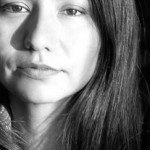 Jacqueline Keeler, Eradicating Offensive Native Mascotry: Jacqueline Keeler is a Navajo/Yankton Dakota Sioux writer living in Portland, Oregon and is a founder of EONM.org (Eradicating Offensive Native Mascotry). She has been published in Salon.com, Indian Country Today and the Nation. She is finishing her first novel “Leaving the Glittering World” set in the shadow of the Hanford Nuclear Reservation in Washington State during the discovery of Kennewick Man.
Jacqueline Keeler, Eradicating Offensive Native Mascotry: Jacqueline Keeler is a Navajo/Yankton Dakota Sioux writer living in Portland, Oregon and is a founder of EONM.org (Eradicating Offensive Native Mascotry). She has been published in Salon.com, Indian Country Today and the Nation. She is finishing her first novel “Leaving the Glittering World” set in the shadow of the Hanford Nuclear Reservation in Washington State during the discovery of Kennewick Man.
 Sanna Saeed, writer: Sana Saeed is a writer on media critique and minority representation in popular media. She is a producer for AJ+, the new digital division of the Al Jazeera Media Network, based in San Francisco. Her work has appeared in Al Jazeera English, Salon, Guardian, ReadWrite, Huffington Post, Policy Mic, The Alternatives Journal, Al Akhbar English, The Islamic Monthly and Buzzfeed. She tweets at @SanaSaeed.
Sanna Saeed, writer: Sana Saeed is a writer on media critique and minority representation in popular media. She is a producer for AJ+, the new digital division of the Al Jazeera Media Network, based in San Francisco. Her work has appeared in Al Jazeera English, Salon, Guardian, ReadWrite, Huffington Post, Policy Mic, The Alternatives Journal, Al Akhbar English, The Islamic Monthly and Buzzfeed. She tweets at @SanaSaeed.
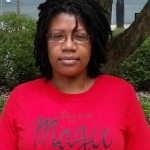 Mikki Kendall, Hoodfeminism.com: Mikki Kendall a writer and occasional feminist divides her time between two careers, a family, and brunch. The last is necessary to provide the energy she needs for everything else on her to-do list. Her writing can be found at XO Jane, Salon, NPR’s Code Switch, Guardian, and a host of other places willing to let her rant. She commits occasional acts of fiction largely focusing on black people in every situation under the sun, and a few under undefined celestial bodies. She can often be found on Twitter engaging in the highest quality shenanigans as @karnythia.
Mikki Kendall, Hoodfeminism.com: Mikki Kendall a writer and occasional feminist divides her time between two careers, a family, and brunch. The last is necessary to provide the energy she needs for everything else on her to-do list. Her writing can be found at XO Jane, Salon, NPR’s Code Switch, Guardian, and a host of other places willing to let her rant. She commits occasional acts of fiction largely focusing on black people in every situation under the sun, and a few under undefined celestial bodies. She can often be found on Twitter engaging in the highest quality shenanigans as @karnythia.
- Q&A (11:30)
- Lunch (12:00)
- Workshop: (Making the Most of your Social Media right now) (1:00)
- Group Think (2:00)
October 23, 2014 — Author Molly McGlennen Presentation/Book Signing and Graduate Student Workshop

Author Molly McGlennen Presentation/Book Signing and Graduate Student Workshop
3201 Hart Hall
UC Davis
Program:
Book Presentation/Signing (12:00 – 1:00 p.m.)
Graduate Mentoring workshop (2:10-3:00)
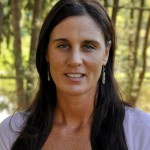 Molly McGlennen was born and raised in Minneapolis, Minnesota and is of Anishinaabe and European descent. Currently, she is an Associate Professor of English and Native American Studies at Vassar College. She holds a PhD in Native American Studies from University of California, Davis and an MFA in Creative Writing from Mills College. Her creative writing and scholarship have been published widely. She is the author of a collection of poetry Fried Fish and Flour Biscuits, published by Salt’s award-winning “Earthworks Series” of Indigenous writers, and a critical monograph Creative Alliances: The Transnational Designs of Indigenous Women’s Poetry from University of Oklahoma Press.
Molly McGlennen was born and raised in Minneapolis, Minnesota and is of Anishinaabe and European descent. Currently, she is an Associate Professor of English and Native American Studies at Vassar College. She holds a PhD in Native American Studies from University of California, Davis and an MFA in Creative Writing from Mills College. Her creative writing and scholarship have been published widely. She is the author of a collection of poetry Fried Fish and Flour Biscuits, published by Salt’s award-winning “Earthworks Series” of Indigenous writers, and a critical monograph Creative Alliances: The Transnational Designs of Indigenous Women’s Poetry from University of Oklahoma Press.
October 17, 2014 (Launch Event): Global Indigenous Identities and Alliances
— Mellon Social Justice Initiative Launch Event —
Please join us!
October 17, 2014
Global Indigenous Identities and Alliances
9:00 a.m. – 3:30 p.m.
Art Annex
UC Davis
Keynote Speaker: Walter Echo-Hawk
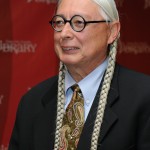 Walter Echo-Hawk (Pawnee) is a Native American speaker, author, and attorney. Throughout his distinguished legal career, he has worked to protect the legal, political, property, cultural, and human rights of Indian tribes and Native peoples. An articulate and versed indigenous rights activist, Echo-Hawk delivers keynote speeches and lectures on a wide variety of indigenous topics, involving Native arts and cultures, indigenous history, federal Indian law, religious freedom, environmental protection, Native American cosmology, and human rights. He is the author of In the Courts of the Conqueror: The 10 Worst Indian Law Cases Ever Decided and In The Light of Justice: the Rise of Human Rights in Native America and the UN Declaration and the Rights of Indigenous Peoples. http://www.walterechohawk.com/
Walter Echo-Hawk (Pawnee) is a Native American speaker, author, and attorney. Throughout his distinguished legal career, he has worked to protect the legal, political, property, cultural, and human rights of Indian tribes and Native peoples. An articulate and versed indigenous rights activist, Echo-Hawk delivers keynote speeches and lectures on a wide variety of indigenous topics, involving Native arts and cultures, indigenous history, federal Indian law, religious freedom, environmental protection, Native American cosmology, and human rights. He is the author of In the Courts of the Conqueror: The 10 Worst Indian Law Cases Ever Decided and In The Light of Justice: the Rise of Human Rights in Native America and the UN Declaration and the Rights of Indigenous Peoples. http://www.walterechohawk.com/
Program:
9:00 – Welcome
9:30 – Keynote Speaker: Walter Echohawk
10:30 – Response by Darcie Houck, J.D. & Others
11:15 – Q & A
Lunch Provided
1:30 – Roundtable Discussion: The Politics of Being Recognized as Indigenous
2:30 – Group Discussion
Watch the World Conference on Indigenous Peoples (September 22-23, 2014)
August 12, 2014
The first World Conference on Indigenous Peoples will be held on 22-23 September 2014. The meeting will be an opportunity to share perspectives and best practices on the realization of the rights of indigenous peoples, including pursuing the objectives of the United Nations Declaration on the Rights of Indigenous Peoples. The high level plenary meeting of the General Assembly to be known as the World Conference on Indigenous Peoples (HLPM/WCIP) will be available via UN Web TV: http://webtv.un.org/
- The World Conference will be composed of two plenary meetings in the form of an opening and a closing session, three interactive round-table discussions and one interactive panel discussion;
- The round-table discussions and the interactive panel discussion will be co-chaired by one Member State and one representative of indigenous peoples who will be proposed by indigenous peoples and subsequently designated by the President of the General Assembly. The co-chairs of the round-table discussions and the panel discussion will present summaries of the discussions at the closing plenary meeting;
Stories of the River, Stories of the People: Hupa, Yurok, and Karuk Memories of the Klamath River Basin (Online Exhibit)
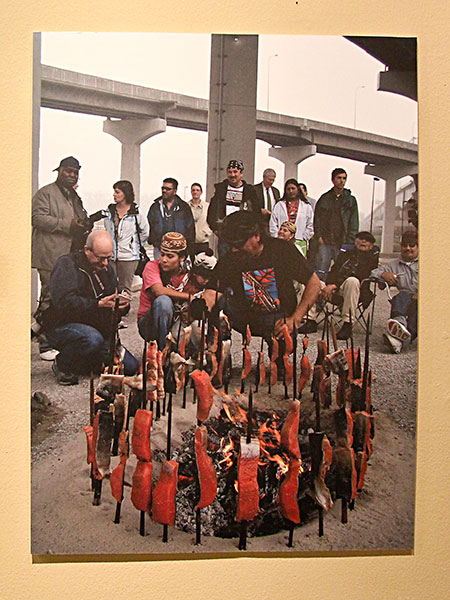
Resources for the classroom and beyond: view the online exhibit and short film now!
About: The Klamath River Basin has served as the source of continued cultural and physical sustenance for the Hupa, Karuk and Yurok people of Northwestern California. With the building of eight dams on the Klamath River between 1903-1962 these forms of sustenance were severely threatened. Grassroots activism to remove the dams arose out of a devastating 2002 salmon die off and directly perpetuated the Klamath Basin Restoration Agreement of 2010.This exhibit is an effort to combine oral history and exhibition techniques to convey the cultural meaning and memory of the Klamath River to the tribes of the Northwest region of California.
http://www.nativewomenscollective.org/storiesoftheriver.html
The Black Bruins [Spoken Word] – Sy Stokes
June 6, 2014
A powerful video of the ongoing sad and shocking reality regarding Black men in the US Higher Education system.
Sign this petition to make a change.
The Black Bruins [Spoken Word] – Sy Stokes
Decolonizing Communities and Geographies at UC Davis and Beyond: Spoken World, Performance, and Activism – Wed., May 28th – Art Annex
May 26, 2014
The Social Justice Initiative, the UC Davis Race Project, and the Ethnic and Cultural Affairs Commission among other key collaborators from Hart Hall invite you to:
Decolonizing Communities and Geographies at UC Davis and Beyond: Spoken World, Performance, and Activism
Decolonizingcommunitiesandgeographies-page-001.jpg
Wed., May 28th — Art Annex — UC Davis
4:00-5:30 pm, Sumi Ink Art
6:00-8:00 pm, Performance/Spoken Word
We are intentionally creating a collaborative space across distinct communities where students can creatively speak out against police brutality, racial pro!ling, university injustices, unfair labor practices, homophobia, transphobia, Islamaphobia, and other forms of gendered racisms and oppressions on campus and beyond. This event builds on the Social Justice Initiative’s vision to keep the 2011 pepper spray incident in our consciousness as we work to build a more just and sustainable environment at UC Davis, particularly one that is critical of white supremacy and the historical legacies of genocide, slavery, and colonization.
We hope you join us for this social justice centered evening of art, performance, spoken word, testimony, and organizing! Bring your colleagues, friends, comrades, students, and collaborators.
Link to facebook page:
https://www.facebook.com/events/1470349763202757/1470365679867832/?notif_t=like
Flyer created by Gilda Posada of TANA: May 28th_ 11x17version
In Memoriam of Stuart Hall
May 24, 2014
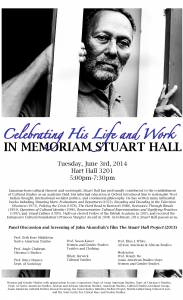 The event is a celebration of Hall’s life and work. There will be a panel, reception and a showing of the Stuart Hall Project.
The event is a celebration of Hall’s life and work. There will be a panel, reception and a showing of the Stuart Hall Project.
Tuesday June 3, Hart Hall 3201, 5-7:30pm
Stuart McPhail Hall, FBA (3 February 1932 – 10 February 2014) was a Jamaican-born cultural theorist and sociologist who lived and worked in the United Kingdom from 1951. Hall, along with Richard Hoggart and Raymond Williams, was one of the founding figures of the school of thought that is now known as British Cultural Studies or The Birmingham School of Cultural Studies.
Undocu…What?
May 19, 2014
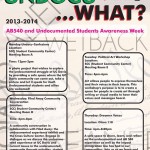 On behalf of Scholars Promoting Education Awareness and Knowledge, in cooperation with Yik’ Al Kuyum and the community, we invite everyone to our annual AB 540 and undocumented awareness week!
On behalf of Scholars Promoting Education Awareness and Knowledge, in cooperation with Yik’ Al Kuyum and the community, we invite everyone to our annual AB 540 and undocumented awareness week!
This year’s theme Undocu…What? aims at educating those who are unaware of the AB 540 and undocumented issue by showcasing events throughout the week. We encourage everyone to attend!
Monday: Undocu-Confessions
Location: SCC ( Student Community Center) Meeting Room A
Time: 12pm-3pm
A photo project that wishes to explore the undocumented struggle at UC Davis by providing a safe space where the UC Davis community can come out, take a picture and let it speak for itself. Undocumented students and allies are welcomed!
Tuesday: Political Art Workshop
Location: SCC (Student Community Center) Meeting Room E
Time: 4pm-6pm
Art allows people to express themselves and their voices in their hearts. This workshop’s purpose is to to create a space for people to create art through writing or visual media to have their voices and messages heard.
Wednesday: Filed Away Community Conversation
Location: SCC( Student Community Center) Meeting Room D
Time: 6pm-8pm
A community conversation in collaboration with Filed Away: the undocumented experience exhibit and the Cross Culture Center. Engage in dialogue as we discuss the undocumented experience at UC Davis and current issues in the undocumented community through activities, student panel and community performances.
Thursday: Dreamer Voices
Location: Olson 118
Time: 6pm-8:00pm
A safe space to share, learn, and reflect on the undocumented and AB 540 experience as well as the impact immigration law has had in our communities. Join us as we learn and share our stories through poetry, spoken word, song, and narrations. What’s your story?A safe space to share, learn, and reflect on the undocumented and AB 540 experience as well as the impact immigration law has had in our communities. Join us as we learn and share our stories through poetry, spoken word, song, and narrations. What’s your story?
Filed Away: The Undocumented Experience 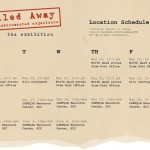
Undocumented, DACAmented, AB540 students, DREAMers, and friends and family of undocumented people, face a variety challenges emotionally, politically, socially, and financially in their daily lives as a result of current immigration policy. While their connection to this identity may many times go unseen, they are a part of our campus community. This exhibition acknowledges the stories of personal objects of just a few of these UCD students.
Exhibit: May 15-June 4, 2014
Community Conversation: May 21, 6-8 pm. Student Community Center Rm D.
Snacks Provided
Doing Critical Race and Ethnic Studies in a Neoliberal Age – UC Santa Cruz – June 6-7
May 18, 2014
Doing Critical Race and Ethnic Studies in a Neoliberal Age – UC Santa Cruz – Humanities 1, Room 210
Friday, June 6 at 4:00pm – 6:30pm & Saturday, June 7 9:30am-5:30pm
This spring bears the fruit of many years of student activism at UC Santa Cruz, namely, the inauguration of a Critical Race and Ethnic Studies (CRES) program dedicated to studying the ideological formations and institutional productions of race and ethnicity. Recognizing that this institutionalization of CRES is both an exciting moment and a reminder of the work we must keep showing up for, we ask:
*How can we foster creative ways to keep activist/academic knowledges in conversation?
*How can scholarly activity be held accountable to social justice struggles?
*How can we build and strengthen ties across institutional and organizational walls?
The context of this moment of institutionalization is the neoliberal erosion of public education and the casualization of all forms of academic labor that have transformed education into a privileged commodity available only to a few and rendered education as a site of labor precariousness. At UC Santa Cruz, recent student experiences with the literal “campus to jail busline” attest to these neoliberal processes. Aimed at fostering critical dialogue about doing critical race work in this historical moment, this symposium brings together community organizers and social justice activists with campus organizers, students, staff, and faculty from regional community colleges, state colleges, and universities to examine militarization, post-9/11 terror-baiting, and the criminalization of racialized bodies as the effects neoliberal policies that cut across campus and community boundaries. photo.php
UC Student-Workers Union Update
May 17, 2014
Preliminary election results are now available
Sign the petition demanding labor peace – drop the charges and stop police intimidation
Take a gander at our strike photos
See where bargaining currently stands
A CALL TO ACTION IN SUPPORT OF THE ZAPATISTAS
May 16, 2014
An attack on the Zapatistas is an attack on us all
Justice for Galeano; Stop the war against the Zapatista communities
(Day of remembrance May 24th)
SUMMARY OF RECENT EVENTS:
On May 2, 2014, in the Zapatista territory of La Realidad, Chiapas, Mexico, the group CIOAC-Histórica [with the participation of the Green Ecological Party and the National Action Party (PAN)], planned and executed a paramilitary attack on unarmed Zapatista civilians. An autonomous Zapatista school and clinic was destroyed, 15 people were ambushed and injured and Jose Luis Solis Lopez (Galeano), teacher at the Zapatista Little School, was murdered. The mainstream media is falsely reporting this attack on the Zapatistas as an intra-community confrontation, but in fact this attack is the result of a long-term counterinsurgency strategy promoted by the Mexican government.
Given the experience of the 1997 massacre at Acteal, we are concerned about the mounting paramilitary activity against Zapatista bases of support. It is clear that if we do not take action now, the current situation in Chiapas may also lead to an even more tragic end.
WHY THIS MATTERS TO US:
Since 1994, the Zapatistas have shown us the bankruptcy of the world that dominates us and, most importantly, the ability to organize ourselves into self-determining communities autonomous from the political class and capitalism. It is this capacity to show that another world is possible in the here and now, one not rooted in exploitation, dispossession, repression and de-valorization, but rather in liberty, democracy and justice, that has inspired us all. An attack on the Zapatistas is an attack on the other world that we have all tried to build along with them for the past 20 years.
WHAT WE SHOULD DO:
We strongly denounce the murder of Compañero Galeano and the attacks against our Zapatista brothers and sisters. We denounce the deliberate destruction of the Zapatista clinic and school. We denounce the disinformation from the press regarding these attacks.
To denounce these aggressions and in support of our Zapatista brothers and sisters, the signatories below call on all Zapatista supporters, students, anti-prison activists, artists, workers, intellectuals, teachers, academics, LGBTQ groups, anarchists, communities of faith, prisoners, communities and organizations of color, indigenous peoples, Chicanos, migrants and all those seeking a more just, non-capitalist world, to pronounce themselves against these attacks by the Mexican government on the Zapatistas and to hold events starting Sunday May 18th (e.g. demonstrations at Mexican consulates and Embassies, corporate subsidiaries, and banks supporting the Mexican government, teach-ins, discussion groups, concerts, informational sessions, or other civil actions that people deem appropriate for their city) and culminating with a day of remembrance on May 24th called by the Zapatistas in honor of the late Compañero Galeano.
Let’s make our dignified pain and rage another building block towards a movement that will directly participate, along with the Zapatistas, in creating this new world.
#ZapatistasNoEstanSolxs
Key article with great resources:
Zapatista teacher dead, 15 seriously wounded in deadly Chiapas ambush
INCITE! Color Of Violence 4 Conference: BEYOND THE STATE: INCITING TRANSFORMATIVE POSSIBILITIES
May 15, 2014

INCITE! Color Of Violence 4 Conference: BEYOND THE STATE: INCITING TRANSFORMATIVE POSSIBILITIES
March 26 – 29, 2015, Chicago, IL
colorofviolence.org
Conference Call for Proposals
INCITE! is excited to announce the Color of Violence 4 (COV4)—Beyond the State: Inciting Transformative Possibilities. This gathering will mark INCITE!’s fifteen years of engaging in grassroots organizing projects, critical conversations, national actions, transnational campaigns, and community building strategies to end colonial, racial, and gender-based violence against women of color, trans and queer people of color and our communities.
Although on-going systems of criminalization and punishment are occupying and devastating our communities, those systems are still often considered the frontline response to violence within and against our communities. Challenging multiple interlocking forms of violence requires new conversations and transformative approaches. Since 2000, INCITE! chapters, affiliates, and partners have developed and learned from non-state based responses to violence rooted in global grassroots liberation movements, local feminist of color practices, communities and organizations. COV4 will highlight emerging strategies, multiple approaches, and new frameworks that re-engage community agency and focus on ending violence without relying on policing, mass incarceration, restrictive legislation, and other systems of violence and control. Non-state based responses to violence are happening in our neighborhoods, families, classrooms, places of worship, friendships, online social networks, political actions, and around our kitchen tables. These efforts have been called “community accountability,” “transformative justice,” “restorative justice,” or simply taking care of our communities and our lives. Examples of these responses in action include: organizing workshops, community-based resources, and art & media projects; convening gatherings, interventions, and brainstorm sessions; and creating grassroots toolkits, participatory research projects, resource lists, and other practical tools to help us figure out what we do next. We believe that these practices are key components of radical movement building.
As we imagine, create, and build on practices that radically value the lives of women of color, trans & queer people of color, and our communities, this conference asks:
What anti-violence organizing strategies are activists, artists, scholars, workers, and community members imagining or implementing “beyond the state?”
What kind of new spaces and models have been invented locally, nationally, and globally?
What core questions still need exploration?
We invite survivors of violence, artists, media makers, health practitioners, advocates, young people, people in the sex trade, students, activists & community organizers, scholars & teachers, and anyone else interested in submitting workshops and presentations that examine these questions and break new ground. Women of color, girls of color, trans & gender non-conforming people of color, Indigenous women and two-spirit people, immigrants of color, and disabled people of color are strongly encouraged to submit proposals. Proposals might also consider the following tensions and challenges:
How do we address violence beyond the state in cases of police violence or hate violence? Is incarceration all we can ask for or are there other possibilities?
How do we scale up community accountability models so that their impact poses a real challenge to the prison industrial complex?
How do we navigate the ways in which non-profit systems and foundation & government grant funding can bind our work to violent institutions?
How do we address the ways in which community accountability or transformative justice strategies have not been responsive for all survivors and scenarios?
How has community accountability been practiced in classrooms and on campuses as a way to address interpersonal harm as well as a way to challenge the violence of the academic industry?
How do we imagine community accountability not only as responses to domestic violence, sexual assault, and other interpersonal harms, but also in the context of reproductive, economic, immigration, colonial, environmental, labor, and medical violence, as well as the violence of prisons, policing, surveillance, genocide, disaster, and war?
How has media been a promising, yet complex strategy for community accountability? How do we address the racial/gendered threats faced by women of color and trans/queer people of color on social media?
How can we challenge the ways in which state violence against people in the sex industry is strengthened and justified by many anti-trafficking initiatives?
How have community-based responses to violence been used within recent insurgencies, such as Idle No More, Not1More anti-deportation actions, anti-capitalist actions, direct actions against prisons and policing, the movement for Boycott, Divestment, Sanctions against Israel occupation, and revolutionary and anti-imperial movements abroad?
This gathering will provide an opportunity for individuals and groups to problem-solve ongoing challenges and share promising strategies. We are open to workshops on any theme that is in keeping with INCITE!’s mission to address the intersections of interpersonal, state, and institutional violence, and welcome a variety of formats: performances, participatory workshops, learning labs, story circles, open discussions, strategy sessions, activist studios, network gatherings, etc.
PROPOSAL DEADLINE: September 1, 2014
Proposals can be submitted on this website: http://colorofviolence.org/
Please send inquiries to: cov4incite@gmail.com
(E-mail works best for us, but if e-mail is difficult to access, you can also leave a voice message at 510.643.4245 and we’ll call you back ASAP!)
Workshop Proposal Form (this form is online at http://www.colorofviolence.org/ or you can fill out the google form athttp://bit.ly/S7JsXG
International Museum of Women has merged with Global Fund for Women
May 13, 2014
The International Museum of Women has merged with Global Fund for Women in a bold move to increase global awareness and action on women’s rights. The merger brings together IMOW’s skills in awareness raising, online advocacy and digital story-telling with the Global Fund’s expertise in issues, grantmaking and fundraising.
International Museum of Women (IMOW)
CALL FOR PERFORMERS!
May 8, 2014
The Social Justice Initiative, the UC Davis Race Project, and the Ethnic and Cultural Affairs Commission among other key collaborators invite you to respond to this…CALL FOR PERFORMERS!
Calling all poets, wordsmiths, lyricists, spoken word artists, storytellers, and performers…
We are joining forces to bring you an evening of “Decolonizing Communities and Geographies at UC Davis and Beyond: Spoken Word, Performance and Activism” on Wednesday, May 28th from 6-8 pm. Mark your calendars.
You are invited to bring voice to your concerns!
We are intentionally creating a collaborative space across distinct communities where students can creatively speak out against police brutality, racial profiling, university injustices, unfair labor practices, homophobia, transphobia, Islamaphobia, and other forms of gendered racisms and oppressions on campus and beyond. This event builds on the Social Justice Initiative’s vision to keep the 2011 pepper spray incident in our consciousness as we work to build a more just and sustainable environment at UC Davis, particularly one that is critical of white supremacy and the historical legacies of genocide, slavery, and colonization.
If you are interested in performing, please contact Alberto at aavaldivia@ucdavis.edu or Susy at sjzepeda@ucdavis.edu with the following information by Sunday, May 18th:
• Name and email
• Title of performance piece
• Brief description of performance (less than 100 words)
We hope you join us for this social justice centered evening of art, performance, spoken word, testimony, and organizing! Spread the word…
Bring Back Our Girls and End the Abduction of Women and Girls in Nigeria.
Dear SJI Community:
According to Professor Amina Mama, of the petitions out there, this is the best one to sign regarding the
recent abduction of women and girls in Nigeria – Petition Link
More information: #Bringbackourgirls and the complexities of attention: Navigating the power of attention when it is part of what the cruel seek
Please share with your networks.
Fri., May 16th — Transnational Challenges to Global Empire: Cultivating Ethical Feminist Praxis
May 4, 2014
Friday, May 16th “Transnational Challenges to Global Empire: Cultivating Ethical Feminist Praxis” – UC Davis
3201 Hart Hall, 9 a.m. – 1 p.m. — Light breakfast will be served
The growth of feminist and ethnic studies has opened up new theoretical frontiers in social justice pedagogy and research. These interrogate the meaning of ‘the public’ in the context of systemic inequalities, combining postcolonial feminist theories of intersectionality with insights deriving from transnational feminism. Discussants are challenged to explore the ethical and methodological implications that arise from bringing the insights of US-based feminist work into dialogue with the work of transnational feminist movements.
Speakers include: Chandra Talpade Mohanty, Linda Carty, Paula C. Johnson, Dana M. Olwan, Amina Mama, Susy Zepeda, and Margo Okazawa-Rey
Petition from Concerned Students and Community Members of UC Davis
May 1, 2014
Petition from Concerned Students and Community Members of UC Davis:
UC Davis Students and Community: End “Cinco de Drinko”! – Sign the Petition!
Department of Native American Studies – Brown Bag Lecture Series – Spring Quarter 2014
Department of Native American Studies
Brown Bag Lecture Series
Spring Quarter 2014
12:15 p.m. to 2:00 p.m.
Wednesdays
Risling Room — 3201 Hart Hall
The Native American Studies Department hosts a quarterly Brown Bag Lecture Series featuring research presentations
by UC Davis faculty and graduate students, as well as invited Bay Area scholars whose work addresses issues
central to Native American and Indigenous Studies.
May 7: UCD NAS Undergraduate Research Panel
Justen Deaton, “Decolonizing Methodologies in Indigenous Hip Hop”
Fabian Iglesias, “Marginalization and Appropriation of Indigenous Dances in the Ballet Folklorico de México”
Pamela Pretell, “The Powwow at UC Davis”
May 21: “Community and Citizenship: Brassbands in Oaxaca, Mexico”
Sergio Navarrete Pellicer, Ph.D., CIESAS-Pacífico Sur & Visiting Scholar – University of California, Santa Cruz
Co-Sponsored by Native American Studies, Hemispheric Institute on the Americas (HIA), Indigenous Research Center of the Americas (IRCA) and the Department of Music.
May 28: “On Recent Lexical Innovations in Hupa”
Justin Spence, Ph.D., Assistant Professor, Native American Studies – University of California, Davis
June 2 (Monday): “Music and Indigenous Modernities: Maori and American Indian Perspectives” Lecture – Demonstration
Rob Thorne, M.A., Independent Musician-Scholar, New Zealand
John-Carlos Perea, Ph.D., Assistant Professor, American Indian Studies – San Francisco State University
Co-Sponsored by Native American Studies, Hemispheric Institute on the Americas (HIA), The Department of Music and The Asian American Cultural Politics Research Group.
June 4: “Poetic Narratives and the Construction of a Post 1995 Mayan World in Chiapas”
Silvia Soto, Graduate Student, Native American Studies – University of California, Davis
public lecture and workshop featuring Engseng Ho – Monday, May 12
Middle East/South Asia Studies presents
a public lecture (with lunch) and workshop featuring
Engseng Ho
Professor of Cultural Anthropology, Duke University
Rethinking History, Rethinking Asia:
Reading Egypt through Indonesia
Monday, May 12 (lecture: 1-2, workshop 2-4)
273 Social Sciences & Humanities Bldg.*
Engseng Ho spent two years in Yemen conducting research that revealed a rich history of people who traveled throughout East Africa, the Arab world, India, and Southeast Asia, intermarrying and contributing to the establishment of new Muslim religious, political and legal institutions. The
dissertation grew into a book: The Graves of Tarim: Genealogy and Mobility across the Indian Ocean (University of California Press, 2006). Professor Ho will present a reading of the developments in Egypt in the last few years from the perspective of the Indonesian experience.
Magid Shihade (Institute of International Studies, Birzeit University), who is currently a research associate at the Middle East/South Asia Studies Program with a postdoctoral fellowship funded by the Social Science Research Council (SSRC), will introduce his SSRC funded project, “Rethinking
History, Rethinking Asia,” at the workshop following Engseng Ho’s lecture.
During the workshop, faculty and graduate students will discuss how the concept of Rethinking Asia and Ho’s work on Reading events in Egypt through the Indonesian experience might shed more light into the developments of the region, and how that approach might intervene in their own research or area of study, generating a conversation about what this might mean for Middle East/South Asia studies at large as well. The workshop will be facilitated by Baki Tezcan (Associate Professor of History, and Religious Studies; ME/SA Director) and will include faculty members and graduate students from UC Davis.
If you are interested in participating in the workshop or have any questions, please contact Dr. Shihade at: mshihade@gmail.com
* To reach the venue, please take the elevators located to the right (east) of the Center for Science and Innovation Studies <http://innovation.ucdavis.edu/contact/csis-map/view> to the lower level.
Sponsored by the Social Science Research Council, Middle East/ South Asia Studies Program, and the Department of Asian American Studies.
Bettina Ngweno, “Investigating Indian Ocean Imaginaries: Navigating the Space between Orientalism and Slavery Denial”
April 17, 2014
Bettina Ngweno, “Investigating Indian Ocean Imaginaries: Navigating the Space between Orientalism and Slavery Denial”
Thursday, April 24, 2014
4:10-6:00 pm, 3201 Hart Hall
How has the Indian Ocean been imagined? How do current portrayals of the Indian Ocean, its continental limits and its inhabitants affect the way we think about the past and understand the present? In particular what are ways to navigate conflicting imaginaries of the Indian Ocean?
Bettina Ng’weno is an Associate Professor of African American and African Studies at the University of California, Davis. Trained in anthropology and originally from Kenya, she conducts research on states and property in Latin America and Africa. She is the author of Turf Wars: Territory and Citizenship in the Contemporary State, (Stanford 2007) and articles on race, ethnicity, and comparative international area studies.
CULTURAL STUDIES GRADUATE GROUP
SPRING 2014 COLLOQUIUM SERIES
UC Davis Women of Color Conference – Call for Abstracts
April 16, 2014
UC Davis Women of Color Conference – Call for Abstracts Now Open!
Women of Color Academic Conference: Cultivating New Directions for Self-Determination
The 2014 Second Annual UC Davis Women of Color Conference is an opportunity to share your research, network with students and faculty, and engage in critical discussions on the experiences of women of color in academia.
Mission Statement:
The mission of the UC Davis Women of Color Conference is three-fold. First, to provide a safe and supportive forum for self-identified women of color to present their research. Second, to identify particularities that self-identified women of color encounter in the academy. Third, to provide an interdisciplinary forum that will provide a space to critically and constructively discuss research and methodology, as well as important issues facing women of color in academia.
Conference Goals:
● To create space within the university for the recognition of undergraduate and graduate women of color scholarship, across all disciplines and methodologies
● To provide a forum for critical dialogue on the experiences of women of color in academia
● To support the professional and personal growth of women of color in the university
● To encourage women of color scholars to build networks and develop connections with other students and faculty on campus
Conference Details:
The conference is scheduled for Saturday, May 10, 2014 and will take place at the Student Community Center (SCC) on the UC Davis campus. This event is open to all UC Davis community members.
How Do I Participate?
There are many ways to get involved! You can present your own research, organize a group discussion or panel, or volunteer to moderate a session. Research at all stages and across all disciplines is highly encouraged.
Click the link below to fill out an application and indicate your interest:
[ http://tinyurl.com/WoCSummit2014 ]
The deadline to submit applications is Friday April 18th at 5pm
Have questions or need more information?
Contact the Women’s Resources and Research Center:
First Floor, North Hall
TRANSGENDER STUDIES MATTERS @ UCB – Fri. April 18th
April 13, 2014
TRANSGENDER STUDIES MATTERS
Friday, April 18th, 2014
132 Boalt Hall, UC Berkeley
What are the objects and inquiries of contemporary Transgender Studies? Explore the state of the field in this one-day symposium featuring the next generation of emerging transgender studies scholars speaking on such topics as experimental method, the place of surgery, environment, and citizenship. The talks will be paired with responses by UC Berkeley faculty.
PANEL ONE 10am to 12pm
Queer Lovers, Hateful Others, and Injured Trans People: Queer Regenerations of Race, Space and the Urban Environment
Jinthana K. Haritaworn, Environmental Studies, York University
w/ Paola Bacchetta as respondent (Gender & Women’s Studies, UCB)
Trans- Surgery Matters
Eric Plemons, Anthropology, University of Michigan
Marcia Ochoa as respondent, Feminist Studies UC Santa Cruz
PANEL TWO 2pm – 4pm
Jorgensen’s Shadows
C. Riley Snorton, Communication Studies, Northwestern University
w/ Juana Maria Rodriguez as respondent (Gender & Women’s Studies, UCB)
Reframing Agnes
Kristen Schilt, Sociology, University of Chicago and Chase Joynt, Visiting Artist, University of Chicago
w/ Raka Ray as respondent (Sociology, UCB)
Sponsored by: the Haas LGBTQ Citizenship Cluster, the Center for the Study of Sexual Cultures, and the Department of Gender & Women’s Studies – Chau Hoi Shuen Program in Gender and Science
Israel in Asia: Settler Colonialism, Mobility, and Rupture
April 3, 2014
Middle East/South Asia Studies, UC Davis Event: Shihade lecture
Israel in Asia:
Settler Colonialism, Mobility, and Rupture
A public lecture by
Magid Shihade
Faculty Member at the Institute of International Studies, Birzeit University, Palestine.
Monday, April 7th
12:00pm
2203 Social Science & Humanities Building
(Andrews Conference Room)
Magid Shihade is a faculty member at the Institute for International Studies at Birzeit University, Palestine and is currently a research fellow affiliated with the Middle East/South Asia Studies program at the University of California-Davis. He is also a postdoctoral transregional fellow at the Social Science Research Council. His research focuses on decolonization, modernity, violence, identity, and the anthropology and politics of knowledge. His book, “Not Just a Soccer Game: Colonialism and Conflict among Palestinians in Israel,” was published in 2011 by Syracuse University Press. He has published several articles and book chapters about topics such as Ibn Khaldoun and alternative political theory and settler colonialism in Israel-Palestine and has edited a special issue of the journal Interface on the Arab Spring. His new research project is a study of Palestinians in Israel during military rule from 1948-1966, tentatively titled: “Israel in Asia: Settler-Colonialism, Mobility, and Identity among ’48 Palestinians.”
Website: mesa.ucdavis.edu
Re-Envisioning Race at UCD – April 7th
April 2, 2014
UC Davis Race Project Event:
Re-Envisioning Race at UCD:
Critical Race Theory to examine the Academy and our communities
April 7, 2014
ART ANNEX UC Davis
12:30 pm
Presentation by Dr. Devon Carbado
�What’s Left of Affirmative Action�
(lunch provided!)
2:30-4:00 pm
Workshop facilitated by Dr. Devon Carbado on
Critical Race Theory: Praxis and Action
4:30-6:00 pm
Student Activist Panel
MEChA: Jocelyn Garcia, Michelle Villegas & Guadalupe Lou Salgado
Davis Dem Socialists: Rebecca Hernandez and Melody Yee
APIQ: olives Nguyen
Rachel Feldman from Jewish Voice for Peace and a BDS activist
BDS president: Diyala Shihadih
Moderated by Professor Wendy Ho
(snacks provided!)
Funded by a grant by UC Center for New Racial Studies. Co-sponsored by: UCD Race Project Aoki Center for Critical Studies of Race and Nation, Chicana/o Studies Department, and Asian American Cultural Politics Research Group
AAS 298B: A RARE TEAM-TAUGHT GRADUATE SEMINAR IN “RACIALIZATION AND PUBLICNESS”
April 1, 2014
A RARE TEAM-TAUGHT GRADUATE SEMINAR IN “RACIALIZATION AND PUBLICNESS”
AAS 298B: Directed Group Study in African Studies AAS 298 Flyer
SPRING 2014 2215 Hart Hall Fridays: 10 am-12.50pm
This seminar reconsiders the fundamental relationship between racialization and publicness in modern times. Against the backdrop of theoretical, ethnographic, visual, aural, embodied and print frameworks and/or traditions, the seminar engages with how the tensions, contradictions, challenges and opportunities of publicness (re)configure and (re)determine racialization of people of African descent around the world and how different states, societies, institutions, structures and agents enact, and react to, such racialization in and through language & literature, music, politics, social formations, gender, territoriality, (im)migration, etc. The seminar series is taught by faculty from different disciplines whose research and teaching are informed by interdisciplinarity.
Co-taught by Professors Moradewun Adejunmobi, Bruce Haynes, Halifu Osumare, Amina Mama, Elisa White, Bettina Ng’weno and Wale Adebanwi
For further information: anadebanwi@ucdavis.edu
Interruptions: Sciences, Feminisms, Knowledges
March 31, 2014
Interruptions: Sciences, Feminisms, Knowledges at UC Berkeley
Friday – Saturday
18 Apr – 19 Apr 2014
Link to schedule: http://cstms.berkeley.edu/current-events/interruptions-sciences-feminisms-knowledges/
Open Statement on the defunding of the National Institute of Research Excellence for Maori Development and Advancement by Professor Linda Tuhiwai Smith
March 19, 2014
Open Statement on the defunding of the National Institute of Research Excellence for Maori Development and Advancement
by Professor Linda Tuhiwai Smith, author of Decolonizing Methodologies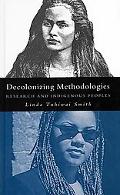
AFRICAN DESCENT COMMUNITIES AND CULTURE IN NORTH AMERICA Course in AAAS!
AAS_107B_Flyer_(1) SPRING 2014 COURSE AFRICAN DESCENT COMMUNITIES AND CULTURE IN NORTH AMERICA in African and African American Studies Department!
African and African American Studies 107B (AAS 107B) MWF 10-‐10:50 Olson 147 – Dr. Elisa Joy White (ejowhite@ucdavis.edu)
Black Canadian Identity
Afro-Mexican Communities
African Native American Communities
New African Diaspora Migrations
AfroQueer Cultural Politics
AfroPunk and Black Metal Scenes
African Disapora in Hawai’i
Alternative Online Communities
Afro Feminist Identities
Black Veganism
…and much more. This exciting course examines a variety of cultural, social, and political communities of African descent in contemporary North America (and Hawai‘i). Expand your horizons! Expect the unexpected!
Chicana/o Studies Spring Courses!
March 18, 2014
DEPARTMENT OF CHICANA/O STUDIES
Spring 2014-Seats Still Available, Register Before They Fill Up Again!
Improvising While Black (IWB): Black Performativity As Resistance And Survival*
Improvising While Black (IWB): Black Performativity As Resistance And Survival* Mary Ann Brooks, MFA MaryAnn_IWB-Flyer3
Improvising While Black (IWB) is an interdisciplinary dance improvisation experiment by second year Theatre and Dance graduate student, Mary Ann Brooks. The seed for IWB sprouted from Brooks’ personal experience of being racially profiled when driving while black (DWB) in San Francisco, California. The project is a multifaceted inquiry into dance improvisation, blackness, and survival. IWB lives in “The Wreck” of collective dreams and desires for some kind of real or imagined future. Through the body, IWB calls up cultural memories from black, queer, colonized/marginalized histories and examines blackness as an improvisatory gesture. IWB finds futurity in the hustle, the fugitive, the ancestor, the flesh, queer outlaws, and dance improvisation as resistance.
Mary Ann Brooks is an educator, activist, dancer and performance artist whose adventures include walking California’s back country mountains to teaching in dance studios in Aotearoa/New Zealand to organizing street theater protests in San Francisco. Before starting the Interdisciplinary Theatre and Dance MFA here in Davis Fall 2012, Brooks danced with aerial dance troupe, Flyaway Productions, in San Francisco and collaborated with numerous choreographers and performance artists while also performing solo work.
*This talk is sponsored by the Consortium for Women and Research.
Kim TallBear Interviewed: Native American DNA: Tribal Belonging and the False Promise of Genetic Science
March 16, 2014
PODCAST of Kim TallBear being interviewed about her new book, Native American DNA: Tribal Belonging and the False Promise of Genetic Science (University of Minnesota Press, 2013):
NAES Conference – RESEARCH JUSTICE: DECOLONIZING KNOWLEDGE, BUILDING POWER – APRIL 3-5, 2014 – MILLS COLLEGE
March 15, 2014
NAES 42nd Annual National Conference
April 3-5, 2014 – Mills College – Oakland, California
Early Bird Registration deadline is March 15th!
https://naes.wufoo.com/forms/rma7pue0ac5ed1/
“The Revolution Can Be Funded! Fundraising Strategies for Social Justice in the Americas”
March 14, 2014
Dear Social Justice Community:
We are very grateful to Dr. Liza Grandia, of the Native American Studies Department, for her insightful and quite brilliant workshop on Fundraising Strategies for Social Justice in the Americas!
It is safe to say that every participant in the room appreciated the interactive nature of the workshop, as well as the depth of the fundraising strategies and vision Dr. Grandia presented. Using her 20 years of experience in working with Indigenous communities in Guatemala and Belize, Liza showed us how “Fundraising is social change work!” Key elements of the discussion were the importance of cultivating relationships with donors/foundations, the need to do diligent research on potential funders, awareness of what your goals and activities are in relation to one’s budget, as well as putting forward an articulate and memorable story about your research as part of a funding proposal.
Liza offered a wealth of key resources as well as “golden nuggets,” some of which we will work to share on the SJI website. Needless to say, two hours was not sufficient time to cover the wealth of this material. We are in discussion with Dr. Grandia to do a follow-up workshop or series of workshops for interested faculty, students, staff and community members. Please check back for more details.
In Solidarity,
SJI Team
Science, Sexuality, and (In)Security Roundtable Event
The SJI team is grateful for the enthusiastic participation in Friday, February 28th Science, Sexuality, and (In)Security Roundtable Event!
For those who missed the event, want a refresher, or would like to share it with their students and colleagues: here is the link to the webcast of the SJI program: http://webcast.ucdavis.edu/llnd/5fe1cab3
In addition, David Michalski, MLS. Ph.D. of the Peter J. Shields Library has established a Social Justice Initiative: Resources and Research site.
“This site supports the UC Davis Mellon Research Initiative “Social Justice, Culture, and (In)Security” by providing a guide to research into both the area of social justice, and on how to conduct research in service of social justice movements.” Please pass on the link to your students, colleagues, and communities. The second tab is directly connected to this event.
http://guides.lib.ucdavis.edu/social_justice_initiative
Go to Events Schedule on this site to find additional information such as biographies of key speakers.
Women & Gender Studies Spring 2014 courses!
March 13, 2014
WMS 182: Globalization, Gender, & Culture
CRN # 43976
Professor Amina Mama, Women and Gender Studies
TR 12:10-2:00p, Hutchinson 102
This course introduces globalization as a process of interconnected cultural, social and economic transformations. Participants will develop transnational and feminist perspectives on the differentiated and unequal effects of globalizing institutions around the world. Key globalizing institutions (military, political, economic and cultural) will be discussed to highlight the micro-political, institutional and macro-economic dynamics of global changes. Combining critical perspectives on international development with feminist perspectives on the global economy, labor and social relations, and the meaning of identity, the students will develop an understanding of the gender, class and ethnically differentiated local impacts of global power. Examples will be drawn from the Africa, Asia and Latin America and the USA.
WMS189: Race, Gender, Sexuality, Disease, Public Health and Colonial and Empire Formations
CRN #42591
Professor Wendy Ho
TR 2:10-4pm
This WMS189 special topics seminar examines public health histories and its interconnections with critical race, gender, sexuality, disease and colonial/empire formations. Inclusive within this discussion will be topics on ethnicity, social-economic class, biopolitics, govermentality, citizenship, trans/nationalism, environment, biocolonialism, contemporary material feminisms. If you enjoy serious reading across disciplines, this may be the class for you. This is an upper-division course and backgrounds in critical race and ethnic studies, women and critical gender studies, cultural studies, medical anthropology and/or public health, medicine and biosciences will be helpful. Graduate students with permission from their departments or programs can take this for graduate credit.
Reading List includes:
1. Nayan Shah. Contagious Divides: Epidemic and Race in San Francisco Chinatown
2. Laura Briggs. Race, Sex, Science and US Imperialism in Puerto Rico
3. Natalia Molina. Fit to be Citizens? Public Health and Race in Los Angeles
4. Harriet Washington. Medical Apartheid: The Dark History of Medical Experimentation on Black Americans from Colonial Times to the Present
5. Philippa Levine. Prostitution, Race and Politics: Policing Venereal Disease in the British Empire
6. Warwick Anderson. The Cultivation of Whiteness: Science, Health and Racial Destiny in Australia
WMS 192: Social Activism Internship (4 units)
CRN# 42600
Professor Susy Zepeda
Tuesdays, 2:10-5pm* (Note revised time)
This Women and Gender Studies 192: Social Activism Internship 4-unit course will be an opportunity to critically engage with concepts such as “community accountability,” “social justice,” and “collaboration and conflict” in a collective classroom setting, while engaging “best practices” at an internship site of choice. We will engage complex questions such as: how do we engage in social activism while practicing self-reflexivity and staying critical of institutions? We will pay close attention to the praxis of building community spaces that honor differences across race, class, gender, sexuality, citizenship status, generation, language, ability, and worldviews.
Students will either continue an internship they have previously participated in or make contact with a social justice-centered organization early on in the quarter to participate in an internship during spring 2014. Students will be required actively participate in fieldwork at their internship site on a weekly basis. Students will be expected to take field notes and keep a reflective journal. If you have questions about a possible internship site, e-mail: sjzepeda@ucdavis.edu.
“I, Too, Am Harvard” photo campaign
March 6, 2014
63 Black Harvard Students Share Their Experiences In A Powerful Photo Project
The “I, Too, Am Harvard” photo campaign explores the diverse experience that black students at Harvard have to face.
http://www.buzzfeed.com/alisonvingiano/21-black-harvard-students-share-their-experiences-through-a
http://itooamharvard.tumblr.com/image/78254929615
Remembering Nelson Mandela
February 18, 2014
From Mujeres Talk blog:
http://library.osu.edu/blogs/mujerestalk/2014/02/18/remembering-nelson-mandela/
by Inés Hernandez-Avila
I wrote this poem for Nelson Mandela in 1988 because he truly moved me, all along the path of his life as I began to know about him, and his spirit will continue to move me, always. The poem speaks for me of what I think of him. He was a great Spirit who came to this earth to be Nelson Mandela, and he kept the radiance he brought with him from the spirit lands of the ancestors. With the example of his life, he “lifted us up,” as my own Nez Perce elder, Albert Andrews would say. I have read the poem at literary events, but it has never been published. On the occasion of Mandela’s death, my dear colleague, Jualynne Dodson asked, on the Ford Foundation Fellows listserv, what the impact of Mandela had been on the Chicana/o community. I sent her my poem, from my own Native (Nez Perce) and Tejana perspective. As I re-read what I had written in 1988, I saw that everything that I wrote for him all these years ago, still holds true. And I did write the poem while listening to Abdullah Ibrahim’s piano composition, “Mandela.” Ibrahim, moved by Mandela, composed his piece, and I was moved by the beautiful music for this great human being, this Maestro, who brought his light to the world. It is a poem from my heart.
For Nelson–Leader, Tribal Person, Elder*
Summer 1988, on the occasion of Mandela’s 70th birthday, when the South African government offered him a six hour visit with his family
Oh Mandela, Mandela
I sing your name
in the name of all peoples locked in and up
in their very cells
weighed down by all the forces
that do not want their hearts light
and spirits lifted
Nelson, Nelson
Triumph is a sweet song
the one you know
saxaphones jubilant for your spirit
concentrating
in your space
to will your conscious waking
sleeping dreams
for all of us to see
And it is hard, Mandela, Mandela
Six hours offered you with family
with Winnie and your daughters
six hours to hold each other
gulp in every detailed facet
talk with hands eyes ears mouth
nose smiles tears
as if the heart of the very mother earth
would burst with joy at such a moment
but this joy cannot be
it is, as you say, not possible
for you are not alone
but one of oh so many whose pain like yours
meted out minutely daily
seeks to engulf you in despair
This visit offered is not to them
but to you
And what is six hours in the face of terror centuries old
horror with the face of most intentional genocide?
Six hours more or less of time
when in those same six hours
Children, little children
sit, like you, in other prison cells for their “subversion”
When heads are cracked and bodies wracked
across the landscape of a continent that is yours theirs
A motherland keeps count of each heart battered to a bloody pulp
to stop its count of life
And you know, too, that count
So you stop the maddened offer of a visit
What would you have said, Mandela, Mandela?
“Shall we have tea, Winnie?
Daughters, rub my back, I am so sore.
What shall we talk about?”
And in the next cells casually inflicting itself
in studied vehemence on seemingly countless others
the obscenity of racial/cultural boundless hatred
Nelson, Nelson
A visit?
We are visiting for you all over the world
for you and with you in our homes your face shines
from the walls of our hearts
Poets gather to sing for you
Peoples gather to struggle with you
Workers pass the light of your name from mouth to mouth
Races, classes and sexes unite for you and for the people
Children learn of you and of the brave children
through whose eyes and spirits we find courage
Agelessness is where principled commitment is born and lives
Even in the splattered, broken bones of death
that wants so badly to detain the march of liberation
in all its splendor
Mandela, Mandela
you are real
The people you stand firm for are real and true
The visionary will outlast the cynic, the impotent and depraved
It is a matter of time
Only a small matter of time
The freedom spirit is soaring from heart to heart
around the world
To stop for six hours for convenience?
No, Nelson, Nelson
How you knew how time is precious
How you knew to keep on soaring
Oh, Mandela, Mandela
Keep on soaring
*With thanks to Abdullah Ibrahim, because this poem was written to his composition “Mandela.” ©Inés Hernández-Avila 1988
Inés Hernández-Avila is a Professor of Native American Studies at UC-Davis, where she is also Co-Director of the UC-Davis Social Justice Initiative. She has been involved in creating both the MA and PhD program in Native American Studies at UC-Davis. Her research and teaching focuses on indigenous literatures of the Americas and Chicana literature and feminism.
Stuart Hall
February 12, 2014
A few pertinent links related to Stuart Hall's recent passing: Stuart Hall obituary: http://www.theguardian.com/politics/2014/feb/10/stuart-hall Stuart Hall, 'Godfather Of Multiculturalism,' Dies: http://www.npr.org/blogs/thetwo-way/2014/02/10/274789348/stuart-hall-godfather-of-multiculturalism-dies John Akomfrah - 'The Stuart Hall Project' - From Colony to Post Colony: https://www.youtube.com/watch?v=2l-Basgy260&list=PLanHEjVVDRvGXLE6ZoJjnnMDtVJNe_0ho
Upcoming Event at UC Santa Cruz:
"The Stuart Hall Project: Revolution, politics, culture and the New Left experience"
Screening at UCSC on Tuesday, February 25th, at 7:30pm in Communications 150 (Studio C).
The film, 102 minutes, will be followed by an informal panel and general discussion
animated by James Clifford (History of Consciousness), Jennifer Gonzalez (HAVC), and Herman Gray
(Sociology).
http://ihr.ucsc.edu/event/screening-and-panel-discussion-the-stuart-hall-project-revolution-politics-culture-and-the-new-left-experience/
http://www.bfi.org.uk/news-opinion/sight-sound-magazine/reviews-recommendations/film-week-stuart-hall-project
Mumia Abu-Jamal and Mass Incarceration Forum–Feminist Wire
January 24, 2014
Follow the Mumia and Mass Incarceration forum on The Feminist Wire this week: www.thefeministwire.com. Authors include Mumia Abu-Jamal himself, Angela Davis, Johanna Fernandez, Beth Richie, Sonya Donaldson, Olivia Jones, Noelle Hanrahan, Alexis Pauline Gumbs, Clyde Gumbs, and Jared Gumbs, Jamila Wilson, Pam Africa, Ramona Africa, Quincy Scott Jones, Jessica Millward, David J. Leonard, Andrea Ritchie, Layla Kristy Feghali, Meron Wondwosen, Walidah Imarisha, Micol Seigel, Gabriel Teodros, Jamila Wilson, Liz Derias, Johanna Fernandez, Emahunn Campbell, Nyle Fort, Soffiyah Elijah, Christopher M. Tinson and Mark Lewis Taylor. New articles are posted daily until next Monday.
Please spread the word. Bring Mumia home!
CFP: Clandestine Migration Routes and Human Insecurity
January 14, 2014
Call for Papers
Clandestine Migration Routes and Human Insecurity
We invite abstracts on the theme of Clandestine Migration Routes and Human Insecurity for a cross-regional comparative workshop to be held on May 17-18, 2014 at the Watson Institute for International Studies at Brown University in Providence, Rhode Island, USA. Please send 200-word abstracts to CMRHIworkshop@gmail.com by February 28, 2014.
Much of the scholarship on migration has focused on the border as a site of control and resistance, as well as on migrant experiences in countries of destination. In contrast, we turn our attention to how migrants arrive at the border, to the vehicles, networks, multiple boundary crossings and hardships that constitute the journey to borders. The journey itself is broadly conceived and includes journeys from countries of origin to countries of transit or destination, as well as deportation journeys.
Some of the research questions that have animated this call for papers include the following:
1) How do these clandestine journeys re-order the socio-economic and political landscape through which migrants pass, and what consequences does this have for the human security of migrants and citizens?
2) How do migrants and citizens resist migration controls along the entirety of routes? Might this resistance and the relationships that underpin it differ from those in border zones?
3) Can the human security of migrants be reconciled with the national security concerns of destination states?
4) In the context of a humanitarian crisis unfolding along clandestine routes, how does a liberal international society justify draconian migration controls?
Every effort will be made to select papers that facilitate discussion across regions, and we will seek geographical breadth. Preference will be given to papers that make comparisons across regions and to papers drawing on fieldwork. Organizing themes for panels may change depending on the paper submissions, but examples include: (1) Race, Ethnicity and Nationality; (2) Gender and Sex; (3) Technology, Criminal Networks and the Political Economy of Transit; (4) Religion, Social Movements and Solidarity; and (5) Detention, Deportation and Migration Policing.
Publication
Based on the workshops proceedings, the organizers will seek to publish a volume (e.g., special issue in a first tier journal) on human security dilemmas in transit corridors. The workshop organizers will encourage scholars to co-author papers in order to generate theoretical insights across different case studies, a methodological limitation in the extant literature on migrant journeys. Our comparative approach to migrant journeys thus addresses two key challenges in migration studies: it moves beyond the emphasis on destination countries and their borders; and it encourages scholars from different regions to work collaboratively in order to generate theoretical contributions that may be more far reaching than those based on single case studies.
If you are interested, please submit a 200-word paper proposal to CMRHIworkshop@gmail.com by February 28, 2014. Final papers are due on May 5, 2014. All materials must be submitted in English. We have some (limited) funding to contribute towards transportation and accommodation costs of workshop participants.
We also invite scholars to join our inter-institutional working group listserv, which will bring together those interested in future publications. To join the working group, please send your contact, affiliation information and a brief explanation of your research expertise to CMRHIworkshop@gmail.com.
Lead Researchers
Noelle Brigden, Postdoctoral Fellow, Watson Institute for International Studies, Brown University, and Assistant Professor, Political Science, Marquette University
Jasmin Habib, Associate Professor, Political Science, Balsillie School of International Affairs, University of Waterloo
Cetta Mainwaring, Assistant Professor, Sociology and Legal Studies, Balsillie School of International Affairs, University of Waterloo
Aysen st bici, Former Fellow, Settling Into Motion Program, Bucerius Foundation, and PhD Candidate, Amsterdam University
CFP: 3rd Annual Native American Studies Graduate Student Symposium Dreaming to Knowledge: Acorn Eaters in Transnational Waters April 17-18, 2014 – UC Davis
CALL FOR PAPERS:
DUE: February 14, 2014 3rd Annual Native American Studies Graduate Student Symposium Dreaming to Knowledge: Acorn Eaters in Transnational Waters April 17-18, 2014 UC Davis (MU-II in Memorial Union)
http://ucdnasgrads.weebly.com/symposium2014.html
Submissions open to all UC Graduate Students
We are pleased to announce the 3rd Annual Native American Studies Graduate Student Symposium, to be held on the UC Davis campus on April 17-18th, 2014. We welcome proposals from all current UC graduate students whose research critically addresses the issues, concerns, and lives of Indigenous peoples worldwide. This year’s theme is “Dreaming to Knowledge: Acorn Eaters in Transnational Waters.” California was a transnational place where Indigenous peoples formed relationships of reciprocity with one another by sharing knowledge prior to the arrival of settlers; California remains a transnational place today. The theme of this year’s symposium seeks to engage with different ways of producing knowledge, be they insights from dreams or wisdom from tradition. With regards to Native American Studies and Indigenous research, some of the questions we seek to dialogue about throughout our two-day symposium include, but are not limited to: How and why do we come to gain knowledge?; How does sharing knowledge create transnational spaces in the university?, How can research in Indigenous Studies model and improve research methodologies?; What kind of research best reflects California’s fluid borders and longstanding tradition of Indigenous dialogue?; What role does an Indigenous dialectic play in academic research? University of California Graduate students from all disciplines are encouraged to participate in this hemispheric dialogue. Papers should be in English and 12-15 minutes in length. Possible areas of interest may include (but are not limited to):
- Arts/Artists
- Structural Inequalities
- Colonization/Internal Colonization/Decolonization
- Survivance
- Community Development/Empowerment
- Teaching in Native American Studies
- Critical Theory/Philosophy/Worldviews
- Tourism and Native Communities
- Culture/Language Preservations
- Animal Studies and NAS Intersections
- Histories
- Performance/Theater and NAS
- Indigenous Methodologies/Interpretative Frameworks
- Queer Theory and NAS
- Literatures
- Women/Gender and NAS I
- Racial/physical/economic/political borders
- Creative expressions (Poetry readings, Art, etc.)
- Representations in popular culture
- Social medias/technologies
- Sovereignties/Autonomies
- Other topics welcomed
Diverse presentation formats are encouraged:
- Paper or oral presentations
- Workshops
- Roundtables or panels
- Showcasing creative work
Submission forms are available on the UC Davis NAS Grad Student website for the 3rd Annual Native American Studies Graduate Student Symposium: http://ucdnasgrads.weebly.com/symposium2014.html
Please email your completed submission form to vdesquivido@ucdavis.edu by February 14, 2014.
SJI Feminist Seminar – “Passionate Politics”
November 15, 2013
Social Justice at UC Davis
Feminist Seminar
November, 2013
We are thrilled to report that the Social Justice Feminist Seminar, “Passionate Politics: Global Feminism and Transnational Activism” held on November 1, 2013, was a huge success! The provocative and historic dialogue featured Charlotte Bunch,* founding director and senior scholar at the Center for Women’s Global Leadership, Rutgers University, and Dr. Margo Okazawa-Rey, Professor Emerita at San Francisco State University, and current faculty of the School of Human and Organizational Development at the Fielding Graduate University in Santa Barbara, California.
Halifu Osumare, Professor and Director of African American and African Studies, opened the event with a ritual from the Yoruba diaspora. She asked all who were present to evoke an ancestor to share in the spirit of the dialogue which would follow, and poured a libation – offering water to the earth and a prayer in honor of the ancestors. She then performed her powerful poem “America, We Came,” which evoked the struggles of various peoples who have migrated to “America,” while acknowledging the original native peoples of this land.
As the program continued, the audience was in for a treat as SJI’s Year 1 Director, Amina Mama, opened the discussion between Bunch and Okazawa-Rey, by asking the honored guests about their first activist experiences, bluntly naming their visible racial difference. Both speakers were highly influenced early on by their racial and gender formations, as well as by societal struggles such as the civil rights movement, the Black power movement, the anti-war movement, and women’s liberation. Participants were treated to a historic debate – and an opportunity to learn the complex stories and respective trajectories of US feminists, while also illuminating how their personal histories intertwine with the fortunes of the US women’s movement.
The politics of identity was a major theme throughout the discussion. Okazawa-Rey discussed how being born in post-war Japan to a Japanese mother and African-American father, and later working in Korea, kick-started her awareness of Japanese and U.S. imperialism and the centrality of militarization in global geopolitics. Bunch discussed how she became aware of her white privilege during her formative years as an activist in the struggle for Civil Rights, where she acquired her political skills and commitments. They both also discussed the intricacies of “coming-out” and forming “radical” community around lesbian identities in the USA during the 1970’s and 80’s.
A powerful discussion ensued, stimulated by the opening question ‘what is the significance of theory for activism, and what does activism contribute to theory?’ regarding the significance of theorizing as activists, and the need to have a clear vision of communicating with a larger public while writing and organizing. Okazawa-Rey insisted that to find sustainability as feminist scholar activist one must be connected to community. Bunch emphasized the importance of face-to-face connections and networking in the growth of women’s movements. Both speakers explored the importance of developing transnational politics in ways that are accountable to communities across multiple locations.
Professor Yvette Flores, of Chicana and Chicano Studies, closed the event by remembering how she came to the U.S. as a teenager, to be deeply influenced by the racial politics and movements of the time. Appreciating Osumare’s opening prayer, Flores reminded the audience that November 1st is Dia de los Muertos, a day to honor the ancestors.
It had been a great day of rich discussion that unearthed feminist contributions to social justice on multiple fronts, spanning differences of class, ethnic heritage, sexuality and generations. Many thanks to all who attended, and a special note of gratitude to our co-sponsors: the Women’s Research and Resource Center, and the Lesbian Gay Bisexual Transgender Queer Intersex Asexual Resource Center.
*The title of this Social Justice Feminist Seminar was inspired by the 2011 film, Passionate Politics: The Life and Work of Charlotte Bunch, which screened on campus prior to the discussion.
ANNOUNCMENT:
Margo Okazawa-Rey invited everyone at the Feminist Seminar to participate in the National Association for Ethnic Studies Annual Conference that will take place in Oakland, California at Mills College on April 3-5, 2014. You can find more information, including the call for papers at: http://ethnicstudies.org/conference
Social Justice at UC Davis Mellon Initiative Launch October, 2013
October 31, 2013
We are pleased to report that the Social Justice Initiative’s Launch Event was a great success! We are grateful to everyone who attended and contributed to this event, including the advisory board and affiliates. Professor Inés Hernández-Avila opened the launch event with a blessing, first for the P’atwin people, “who are the original peoples of the land here,” as well as for everyone present, and for the initiative. She offered a traveling song she learned on the Tule River Reservation, and respectfully sent blessings to the ancestors, who she remarked, are with us as we do our work on this campus. Professor Amina Mama, who hosted the event, introduced Dean Jessie Ann Owens who remarked that the social justice initiative “grew out of the trauma” the campus experienced on November 18th, 2011, the infamous pepper spray incident. Dean Owens offered gratitude to the Hart Hall faculty, students, and staff who dedicated themselves to shifting the climate of the university by envisioning this social justice project that builds on the contested histories of ethnic studies at UC Davis. David Biale, Director of the Davis Humanities Institute, echoed this sentiment by suggesting that “the challenge of social justice remains perhaps the most enduring of the human condition,” noting the worthy and urgent focus for the next three years of SJI’s research and dialogue.
